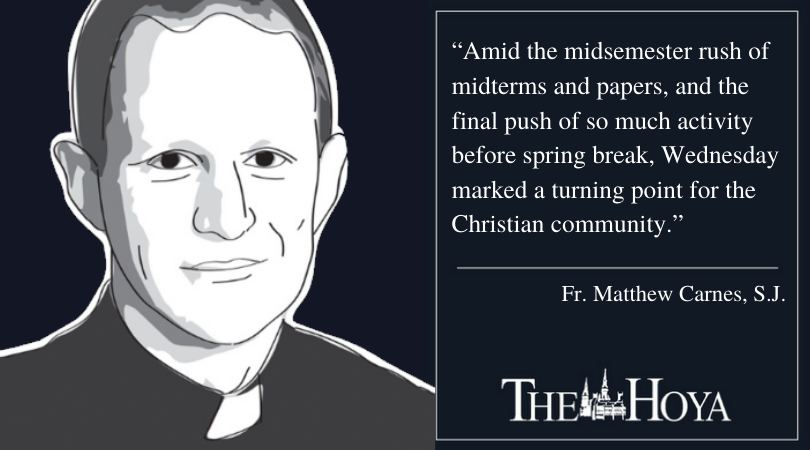Amid the midsemester rush of midterms and papers, and the final push of so much activity before spring break, Wednesday marked a turning point for the Christian community. It was Ash Wednesday, the start of Lent, the 40-day period of prayer, reflection, sacrifice and almsgiving in preparation for Easter. And every year, it is the best-attended day of worship in churches around the globe.
Why does this day of overt religious practice, of public admission that we are sinners, attract so many people? Especially in our secular age and in this time when the faults of the Catholic church are on such clear display, why do so many come, even many who are not Catholic or Christian?
I suspect it is because we find that Lent, and its call to recognize the brokenness in need of healing of our world, resonates with many of our most human emotions.
Unlike so many other spheres of our life — from building resumes to club applications to social media — Lent does not ask us to show only our best faces. In fact, this period gives us the space to honestly gaze at our true selves and our real world. Sometimes, we rightly cry at what we see. Other times, we face the mystery that we are part of this complex world that is so much bigger than ourselves in both its horrors and its wonders.
More than at just about any other time, Lent is when we recognize the truth of sin and the righteousness of judgment. I recognize that neither of those are fashionable words today, but they touch on something essential about human experience. Sin is a rupturing of our human dignity, and of our responsibility to others and ourselves and our planet; it injures and diminishes, and it leaves us empty. We may actively choose it, or we may find ourselves complicit in it. In Lent, we name it for what it is and the harm that it embodies, and we find strength to recommit ourselves to working to heal at least some small part of our relationships.
There is a temptation in Lent, one that Christians have too often fallen into across the centuries: the temptation to revel in excessive judgement and overemphasize harsh practices and even harsher judgements. To use today’s language, there is a temptation to “cancel” indiscriminately, especially oneself, writing off ourselves or others as hopelessly lost.
But the Scriptures proclaimed during this season describe a God who cancels no one. Lent announces a God for whom repentance and conversion is always a possibility and who is always looking for ways to repair our human fissures and faults. Indeed, God reaches out with a forgiveness that far outstrips our own — so much so that it may make us profoundly uncomfortable and may even feel unjust. It invites us to sit lovingly — and I recognize how challenging that word may be — with our own brokenness, and even that of others, and know ourselves as beloved.
Ashes mark the beginning. They remind us of the simplicity and dignity of our origins — no better or worse than any other human being, made from the same stuff as the rest of creation — and they call us to reflection. But the rest of Lent, the time we live now, is when we really embrace its message and experience the transformation it promises.
Over these coming 40 days, practices of prayer and meditation ground and open us up to the transcendent meaning and message of this time. Fasting, or limiting some of our consumption — perhaps by cutting back on social media or the never-ending news or personal drama cycle — helps us focus on what matters most and keeps us in touch with our bodies and their need for healthy habits. And almsgiving, through embracing a generosity of time and attention with those we might otherwise overlook, helps us focus outside ourselves to build a more inclusive, more just community.
Lent is our time to embrace honesty. We recognize the heartbreaking sin of our world, and ourselves, and we find hope in the never-depleted opportunity for change and healing. We stand together, incomplete but in process, open to the life and wholeness for which we long.
Fr. Matthew Carnes, S.J., is associate professor of government and the School of Foreign Service, and he currently serves as the director of the Center for Latin American Studies. As This Jesuit Sees It appears online every other Thursday.














